“Cancer doesn’t define you. It’s a battle that can be won with hope and determination,” says Harteij Bhartesh, a 32-year-old lawyer from Rewa, Madhya Pradesh, a cancer survivor, currently residing in Bengaluru. At just 23, Harteji was diagnosed with the disease. However, instead of letting it define him, he chose to fight with everything he had.
Today, he is a symbol of hope for anyone who feels like giving up. He serves as a reminder that no matter how tough life gets, with courage and support, we can push through even the hardest battles.
Harteij completed his schooling at Kendra Vidyalaya in his hometown before moving to Delhi for his law degree at Amity University. “While in my final semester of college in 2012, a swelling appeared on my neck. At first, I dismissed it as something minor, so I sought homoeopathic treatment, believing it would just subside. I went to the doctors, but they couldn’t detect what was wrong, and I turned to homoeopathy because I wanted to get rid of that swelling. For a year, I didn’t know I had cancer,” he tells The Better India.
However, as months passed and the swelling persisted, he consulted doctors again, but the diagnosis remained elusive. It wasn’t until mid-2013, when he visited his brother in Hyderabad, that the real diagnosis came.
Facing the harsh reality
“None of us anticipated cancer. But when we were faced with the diagnosis, we knew we had to approach it with clear minds and rational thinking,” the 32-year-old recalls. “After undergoing a biopsy, I was diagnosed with third-stage Hodgkin’s Lymphoma, a rare blood cancer. Instead of succumbing to despair, I decided to face this battle head-on,” he adds.
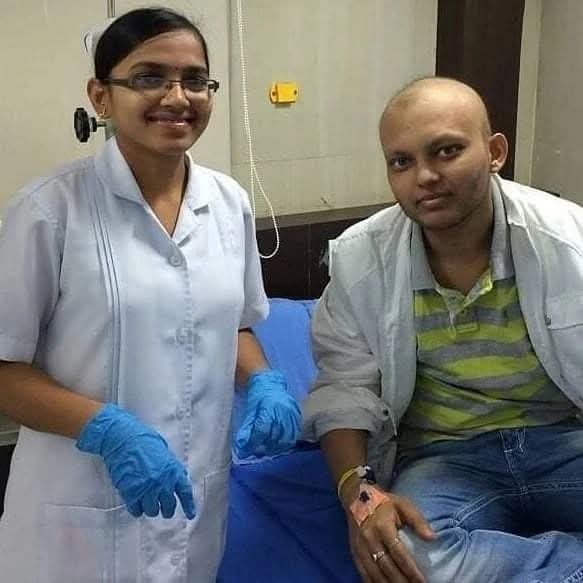
His family, though devastated, hid their own emotions and stayed strong for him. “At that moment, it wasn’t about being afraid. I just wanted to get better as soon as possible,” he says.
“I remember my doctor telling me that the likely cause of my cancer was the food I was eating in hotels during my college days. They often reuse the same oil, and it’s carcinogenic. My oncologist explained this to me, and it made sense. I didn’t want to start chemotherapy immediately as I wanted to complete my studies,” he adds.
For a year, he followed homoeopathic treatment, but unfortunately, this approach only deteriorated his condition. “I was missing out on what should have been some of the most exciting years of my life, my prime time, and I didn’t know what would come next. After a year of trying alternative treatments, I realised something was not working out,” he says.
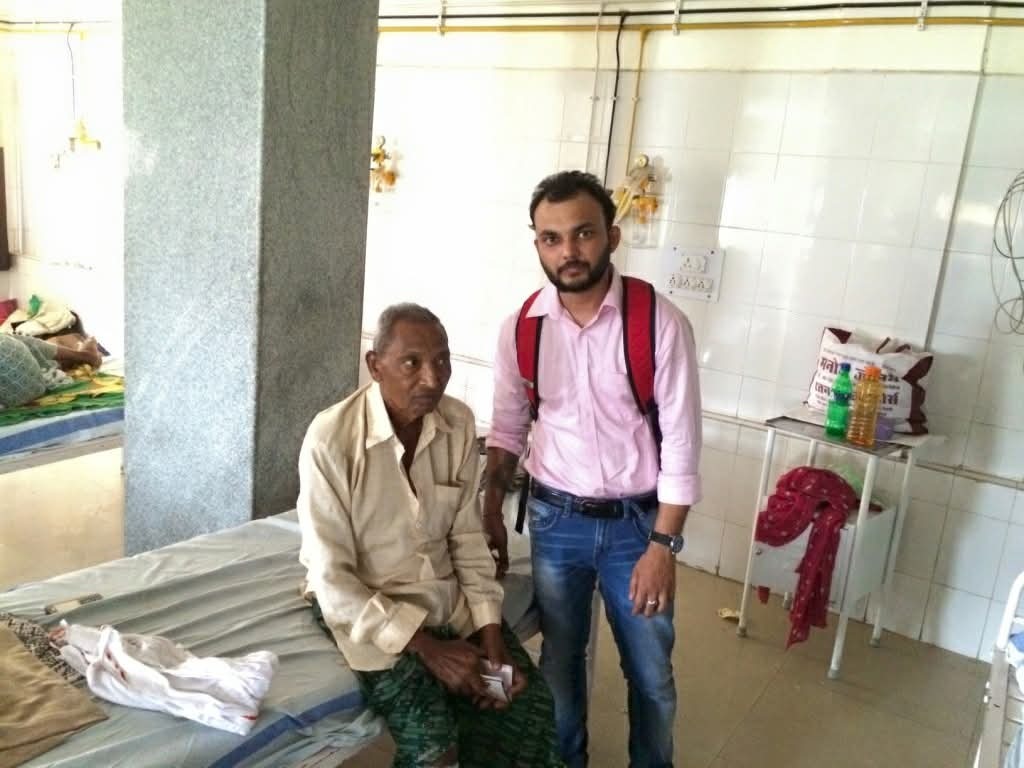
“In 2014, I moved to Bengaluru to pursue my MBA. After getting another PET scan, I discovered the cancer had escalated to the fourth stage and had spread to my bone marrow. That’s when I decided to switch to allopathic treatment. I moved to Hyderabad to stay with my brother and made the difficult choice to leave my MBA programme behind. The real treatment began in the final stage of cancer. I received my treatment at the Indo-American Cancer Institute, also known as Basavatarakam Cancer Hospital, under the care of Dr Senthil Rajappa,” Harteij says.
The financial strain was a source of worry for him. “We are a middle-class family, and the cost of cancer treatment in India is overwhelming. I was constantly anxious about how my family would manage the expenses, but what worried me most was the uncertainty of survival, even after spending such a massive amount,” says the 32-year-old.
Finding support
The physical toll of the treatment was exhausting; the young man endured 12 rounds of chemotherapy, each one taking an increasingly heavy toll on his body, and leaving him weaker and more vulnerable than the last. “I lost my immunity, my hair, and all my energy. I would often feel nauseous and incredibly fatigued after each session,” he recalls.
It was during these difficult times that his brother, Srroth Bhartesh, emerged as his greatest pillar of support. “There were days when Harteij hit rock bottom, and nothing seemed to help. But I made it a point to stay by his side, talk to him, and keep his mind occupied with positive thoughts to help him push through,” Srroth recalls. “He never spoke much about his condition to us. He wanted us to stay hopeful, even when things were tough.”
For many months, Harteij’s mother remained unaware of the severity of his illness. It wasn’t until the seventh round of chemotherapy that the family decided to reveal the truth. “When my mother arrived in Hyderabad to see me, everything felt better. Her food gave me the comfort and warmth that was missing,” Harteij says, his voice tinged with emotion.
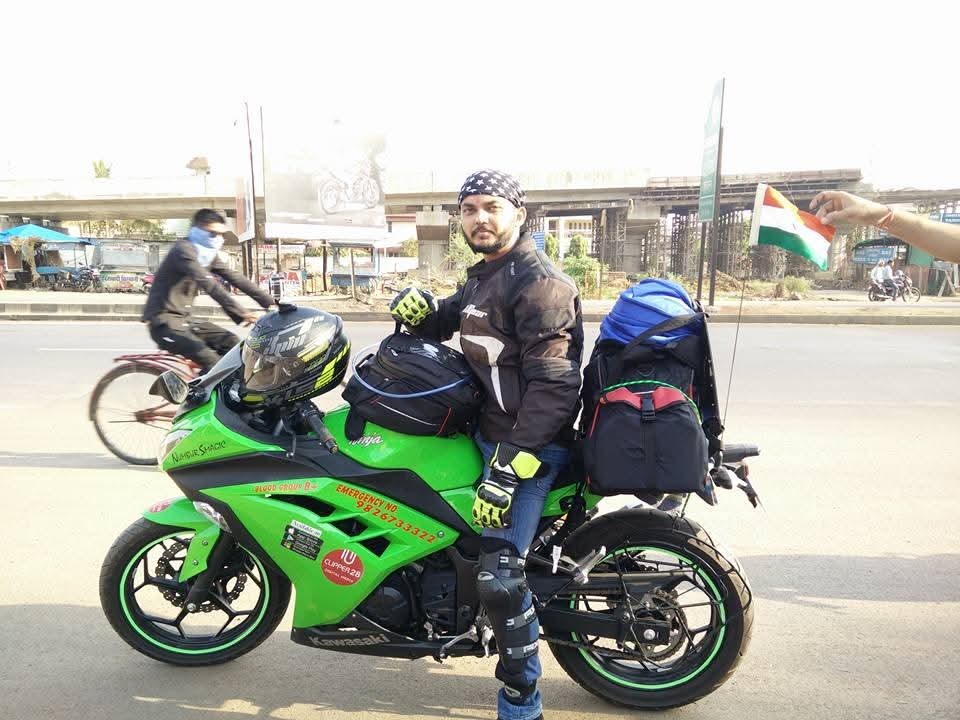
While undergoing treatment, he wanted to raise awareness about the disease. “Initially, I didn’t know where to start or what was the correct way to connect with fellow patients,” he says.
After completing his treatment, Harteij moved to Raipur in 2015 to rebuild his strength and immunity. “I started doing yoga, going to the gym, anything I could do to get back to full health,” he recalls. In 2016, he shifted to Pune to look for a job, but he quickly encountered challenges. “My CV had a three-year gap, which raised questions from employers. I didn’t have my eyebrows or hair back at that time, so people were naturally curious. When asked, I shared my cancer journey honestly,” he explains.
Despite his openness, some employers were sceptical about his ability to handle the pressures of a corporate job. “There were employers who asked if I could cope with corporate life after everything I had been through, and some even turned me down,” he admits. This rejection led to a sense of frustration but also inspired him to take action.
The ‘Ride of Hope’
“I decided to raise awareness about cancer, and that’s when I came up with the idea of a cancer awareness ride,” he explains. He planned to travel across the country, meet cancer patients, and show them that life could continue after chemotherapy. However, he needed funds to make this dream a reality.
“I called my father for some financial support, and my brother stepped in as well. To help fund the ride, I reached out to the yoga centre where I practised, but they weren’t willing to sponsor me. However, my friends in Raipur, many of whom were fellow riders, came together and helped raise Rs 30,000,” he says. For Harteij, the financial support was important, but the emotional boost was even greater.
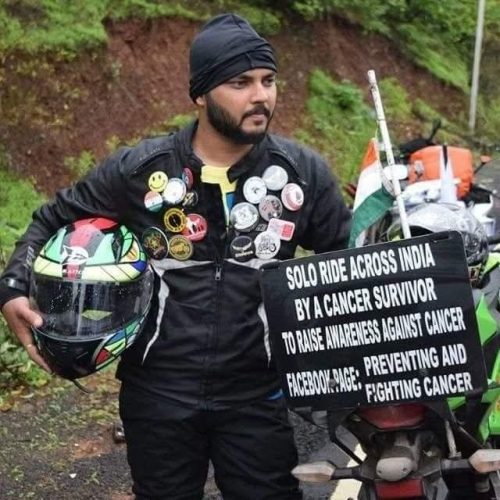
“The hardest part for me was to ensure that Harteij was physically prepared for the ride. He had been through so much, and yet, he was determined to get on that bike and spread the message. I had full confidence that he would inspire others with his story and grit,” Srroth explains.
On May 1, 2016, Harteij set out on a solo ride across India, covering 15 states and 22 cities. He called it the ‘Ride of Hope’ and wanted to change the way people perceive cancer, and inspire those diagnosed with it to fight.
His ride attracted media attention, allowing him to connect with cancer patients from all backgrounds. Across various states, fellow riders introduced him to cancer hospitals where he could share his story. “While many couldn’t offer financial support, their kindness in providing me with places to stay and meals was truly touching,” he reflects.
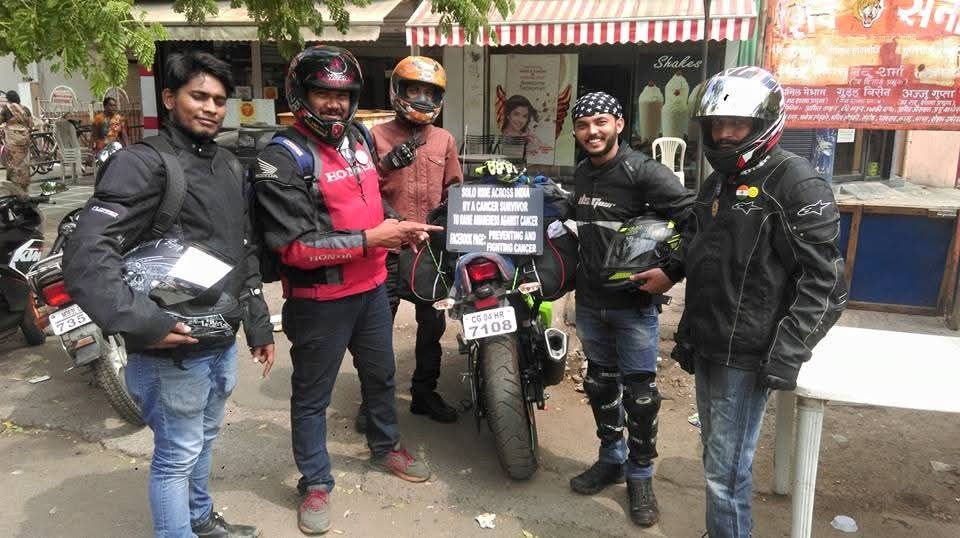
The success of the Ride of Hope was not just in the number of cities he visited or the awareness he spread, but in the lives he touched. One success story still stands out in his memory.
“I met a rider in Pune who became good friends with me. He asked me about how I got diagnosed with the disease and I told him the entire journey. As we talked, we realised that he had a swelling in the same place on his neck where I had. He went for a check-up, and sure enough, he was diagnosed with cancer at an early stage,” Harteij recalls. “He caught it early, and with the right treatment, he recovered quickly. To this day, he and his family thank me for encouraging him to get tested when he did.”
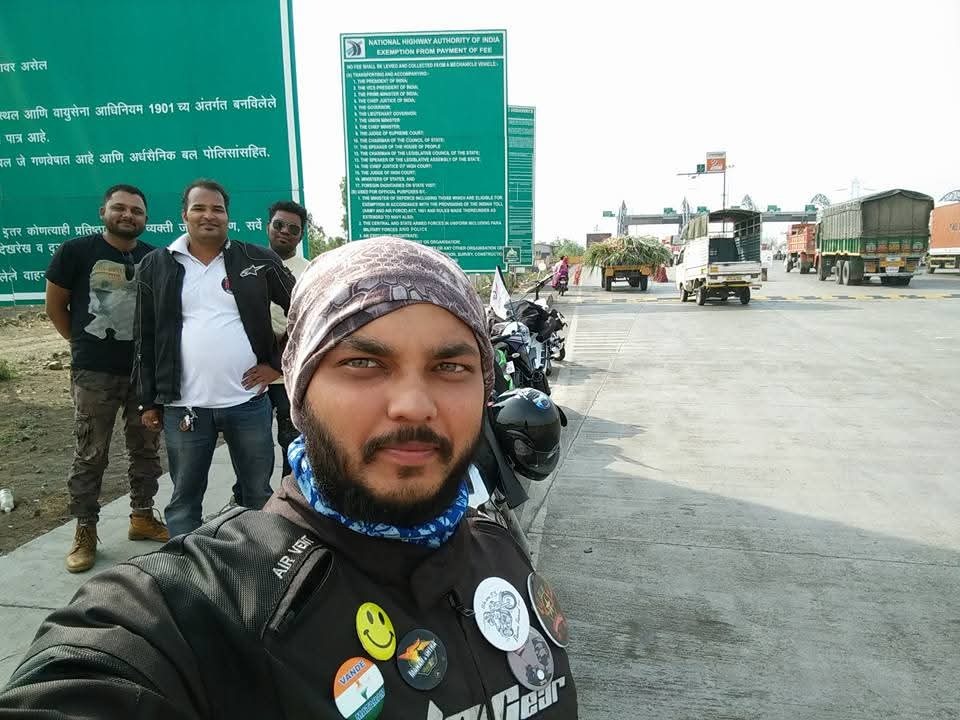
Throughout his journey, Harteij met countless cancer patients who shared their stories with him, many of whom were inspired by his resilience. “People began to realise that cancer doesn’t mean the end. It’s just another challenge in life, one that you can overcome with the right attitude and treatment,” he says.
One of the most touching moments of his journey came when he met a woman who was struggling with breast cancer. Through his encouragement and guidance, she found the strength to fight her illness and is now a survivor.
‘I believe that mental support is just as important as medical treatment’
Today, the 32-year-old cancer survivor continues to inspire people through his NGO, Harteij Cancer Foundation, founded in 2020. While he has not yet received significant funding for the foundation to help with treatment costs, his focus remains on providing mental support to cancer patients.
“I believe that mental support is just as important as medical treatment. When I was going through my journey, I had no one who truly understood what I was going through, except my family. I don’t want others to feel that way,” he explains. He uses his social media platforms to raise awareness, connect with cancer patients, and offer guidance on diet and lifestyle changes.
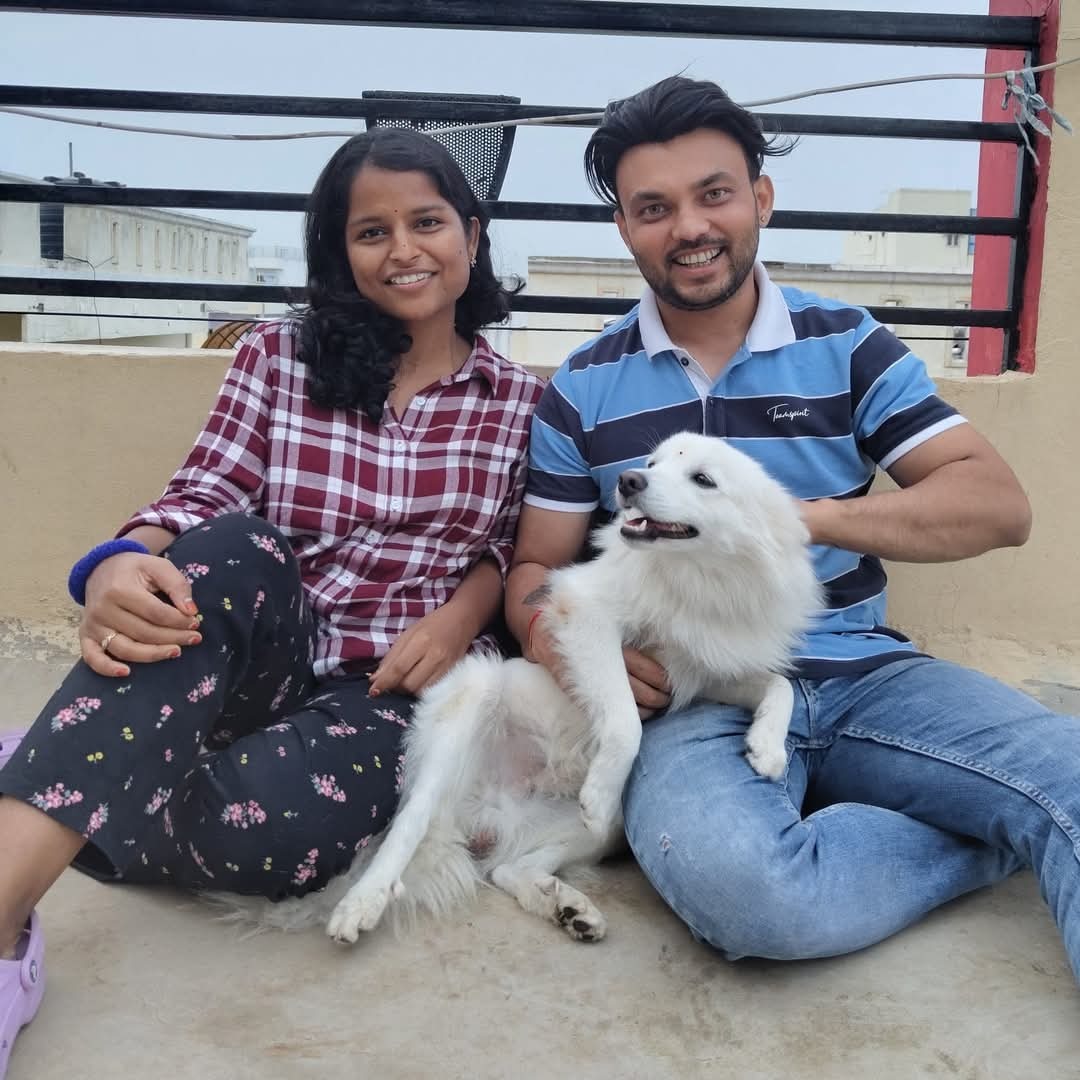
“I’m not a doctor, but I have lived through the disease. And that experience is something I can share with others,” he says. This 32-year-old is ready to get married this month and has big plans for the future. “I want to return to my Ride of Hope initiative, once I get the funding I need,” he shares. “But this time I hope, my fiancée, Samrakshini G., who is a cancer survivor and a doctor, can join me. Together, we’ll continue to inspire others and show them that no matter what, life doesn’t end with a cancer diagnosis.”
“Cancer is conquerable. My brother always says, ‘Let’s make fighting cancer cool.’ He is passionate about uplifting the spirits of cancer patients and survivors and changing society’s perspective on those affected by the disease. There’s still a stigma surrounding it, but he wants to shift that narrative and we are here to help him,” says Srroth.
Edited by Arunava Banerjee; All pictures courtesy Harteij Bhartesh
No comments:
Post a Comment